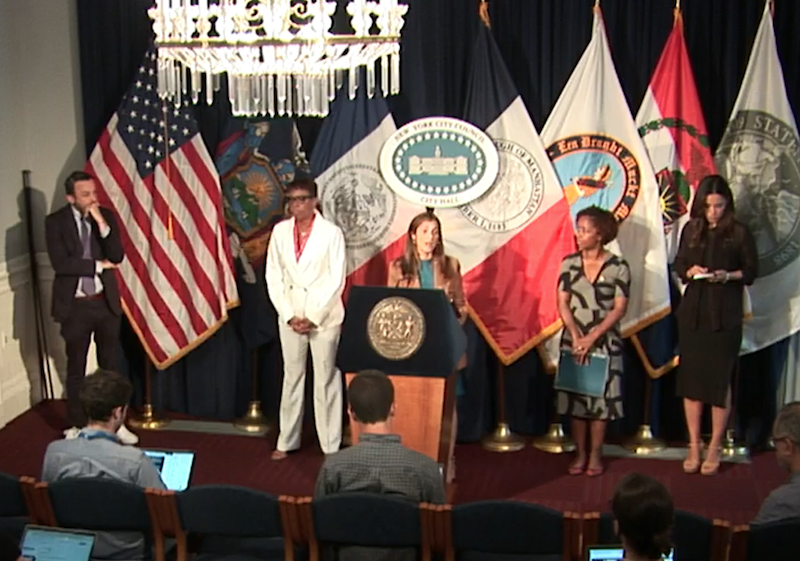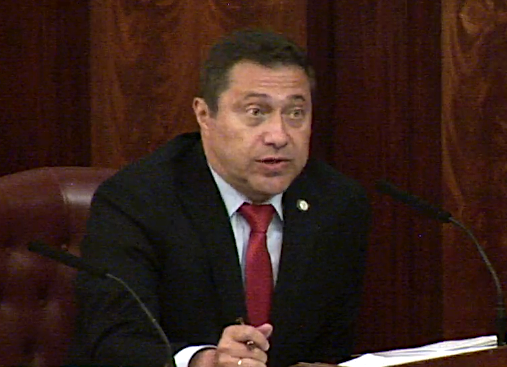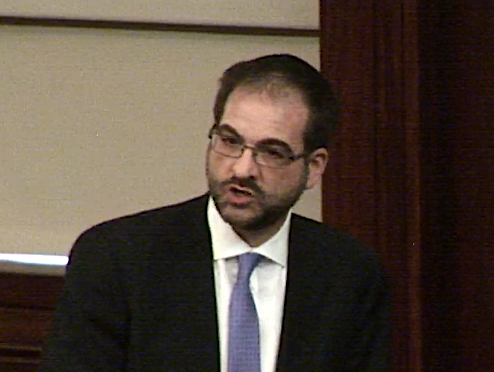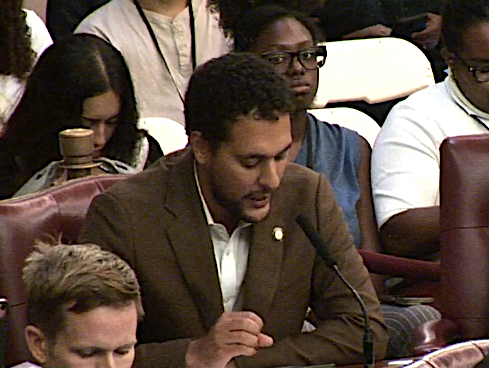BY LINCOLN ANDERSON | Defying opposition by resident groups and community boards from around the city, the City Council on Thursday approved legislation for a permanent Open Restaurants program.
The vote was not unanimous, though, with 34 councilmembers voting “yes” and 11 “no” — or about one-quarter of the members being in opposition.
Councilmember Christopher Marte, who represents Lower Manhattan, voted against the measure, after giving a forceful statement in support of his beleaguered constituents, whom he said are being negatively affected by the current program. Councilmember Erik Bottcher, who represents the West Side from Greenwich Village to Hell’s Kitchen, voted “no,” though without explaining his vote during the Council meeting. Councilmember Carlina Rivera, whose district includes the East Village, voted “yes.”
Before the vote, Rivera joined Council Speaker Adrienne Adams and Councilmember Marjorie Velazquez, the bill’s prime sponsor, at a press conference touting the bill. Also standing with them was another co-sponsor of the bill, Councilmember Keith Powers, who represents Stuyvesant Town, Waterside Plaza and Murray Hill.
Although a backer of the bill, Rivera was not listed as one of its co-sponsors. Perhaps explaining that is the fact that there certainly is plenty of opposition to outdoor dining Downtown.
At the press conference, Speaker Adams — in response to a reporter’s question — flatly denied that she had previously come out against roadway dining.
“No, no, no…,” she insisted. “There is a place for both types of outdoor dining [on the sidewalk and in the curbside lane], and I am so glad that we are going to pass this legislation today.”
However, as Streetsblog reported last September, Speaker Adams said, addressing a Citizens Union breakfast, “Outdoor dining, in my perspective, should be sidewalk. The street extensions were designed to be temporary.”

Meanwhile, Velazquez praised the process of crafting the final Intro 31 bill as extremely “democratic.”
“This bill is the culmination of bringing everyone to the table and considering the concerns of each borough,” she said. “It was a prime example of democracy at work.
“Outdoor dining helped buoy New York City’s economy during the COVID lockdowns, and has been embraced as a creative solution to address the post-pandemic economic crisis,” Velazquez added. “We have spent the past year negotiating and modifying the bill to be as inclusive and equitable as possible, meeting the needs of the different types of restaurants and eateries across our city. This was not a one-size-fits-all bill, and that’s the beauty of it.”
However, residents who oppose Open Restaurants charge the measure was blatantly “lobbyist-driven,” with the New York City Hospitality Alliance leading the way, with a close assist from the bicyclist-advocacy group Transportation Alternatives. And they said the bill, in fact, is one size fits all because — while it might consider differences in types of eateries — it doesn’t do the same for how the program affects the city’s vastly different neighborhoods, with nightlife-heavy, low-scale neighborhoods like Greenwich Village and the East Village being especially heavily impacted.
A “rulemaking process” will follow next, Velazquez explained. The Department of Transportation will be involved with that.
“We’re addressing the sanitation aspect,” she said, “and the reality of people not having a structure outside and what are we going to do in the cold, winter months?”
Velazquez, whose Bronx district includes City Island, Pelham Bay and Throggs Neck, extolled Open Restaurants for opening up the outer boroughs to outdoor dining, saying 50 percent of the program’s locations are outside Manhattan. Opponents in Downtown Manhattan are fine with that, but object that their destination and restaurant-saturated neighborhoods are overloaded with outdoor dining.
Intro 31 would repeal the city’s current sidewalk cafe permitting process and streamline it, plus allow roadway dining for three-quarters of the year. To allow restaurateurs to, as the bill’s summary states, “transition from the emergency outdoor dining program created in response to the COVID-19 pandemic” and apply for a new permit, the contentious roadway sheds would be allowed to stay up until late next year. Once the permanent program kicks in, shed structures would no longer be allowed going forward. Operators would instead be required to create outdoor dining spaces with removable furniture — chairs, tables and possibly umbrellas.
In a press release headlined, “Mayor Adams celebrates passage of outdoor dining bill,” Adams proudly proclaimed that the program “is here to stay.” The bill, in fact, was introduced specially “by request of the mayor.” Adams has earned the moniker “The Nightlife Mayor.”
“Outdoor dining is here to stay in New York City,” he said, “and after decades of deliberation and a temporary program that showed us so much potential, I’m proud to lead the administration that will deliver a superior permanent outdoor dining product to New Yorkers and all those visiting the five boroughs.”
(Regarding the “decades of deliberation,” according to a mayoral spokesperson, people have been advocating for outdoor dining “for decades” in New York City.)
Before casting his vote, Marte hammered the dining “streeteries,” which he said have worsened his community’s quality of life.
“My district has the second-highest concentration of dining sheds in New York,” he railed, adding that dozens of the operators are “bad actors.”
Marte said, specifically, that allowing the outdoor dining spaces to operate until late at night is not acceptable.
“Midnight closing of outdoor dining isn’t for dining — it’s for drinking and partying,” he fumed.
The councilmember concluded his remarks by apologizing to “the thousands of Lower Manhattan residents who are against this.”
In a statement to The Village Sun after the vote, Bottcher said the City Council needs more oversight over roadway dining, which, under the bill, the Department of Transportation will continue to manage.
“While I do support a permanent outdoor dining program and this bill has a lot of good provisions,” he said, “I believe it falls short because it doesn’t give councilmembers the ability to vote on approving applications for dining in the roadbed. It only gives us authority to approve sidewalk cafe applications.”
For her part, Rivera called the final legislation a good “balance,” and said she looks forward to participating in the rulemaking process for the permanent program.
“This legislation will establish a comprehensive, responsible system for outdoor dining that improves on both the pre-pandemic sidewalk cafe process and the emergency program,” she said. “The provisions in this bill provide opportunities for small businesses while balancing the needs of residents through clear enforcement and a community input process. As the rulemaking process moves forward, I will be advocating to minimize any negative impacts on neighbors and for design guidelines that enhance accessibility and sanitation.”

A number of councilmembers who opposed the bill on permanent outdoor dining explained their vote.
Charles Barron, who represents East New York and New Lots, Brooklyn, said, “Many of my constituents said they didn’t want it. It’s causing chaos — even health issues. It’s the roadway cafes that I have big, big problems with.”
Like Bottcher, David Carr, who represents part of Staten Island, said he wanted a “call-up” option, apparently referring to more oversight of the roadway dining.
Other “no” votes included Robert Holden (Woodside and Ridgewood, Queens); Lincoln Restler (DUMBO, Brooklyn Heights, Williamsburg); Vickie Paladino (Bayside, Douglaston, Flushing, Queens); Althea Stevens (Morrisania, Claremont, Bronx); and Inna Vernikov (Brighton Beach and Sheepshead Bay, Brooklyn).
While Marte had referred to the midnight closing time of the temporary program, another naysayer, Kalman Yeger (Borough Park and Midwood, Brooklyn) said he was uncomfortable that permanent outdoor dining’s hours still have not been finalized — apparently, still needing to be set during the rulemaking process. Plus, he said, generally speaking, programs like this should not be blanket, but instead adaptable to the nuances of different communities.
The city has “neighborhoods that are 500 years old and [others that are] 50 years old,” he noted, adding that such a program cannot just be laid over the entire metropolis from “the southern tip of Staten Island to the northern end of the Bronx.” In short, he stated, “one size fits all” does not work in New York City.

Gale Brewer, representing the Upper West Side, voted “yes” on Intro 31 but said concerns about the program must be addressed.
Previously a vocal opponent of outdoor dining, Ari Kagen, who represents Bensonhurst and Coney Island, in Brooklyn, voted for the permanent bill. He said the deciding factor for his changing his position was the axing of the contentious sheds.
“Finally, we are doing away with these wooden sheds,” he said, with relief. However, he added he’d like to see the structures vanish ASAP — not a year and a half from now.
West Village activist Leslie Clark, a spokesperson for CUEUP (Coalition United for Equitable Urban Policy), which formed to fight Open Restaurants, attended the vote in the City Council Chambers. Though disappointed at the outcome, she said it now greenlights opponents to return to court on their first lawsuit. Previously, the Appellate Division had ruled the suit was “not ripe,” in that the permanent Open Restaurants legislation had not passed yet.
“We’re disappointed,” Clark said, “but we’re going back to court. I don’t know if it’s going to be tomorrow — it might have to wait till Monday.”
The suit contends that the city must do a proper, full-scale environmental impact study, or E.I.S., for the Open Restaurants program. The review would investigate dozens of potential impacts — on noise, traffic and beyond. The plaintiffs previously won the first round at the State Supreme Court level.
Clark said the city has had ample time — since the start of the temporary Open Restaurants program during the pandemic — to conduct an E.I.S., yet has declined to do so. Instead, D.O.T. two years ago simply issued a brief, two-page letter claiming outdoor dining would not increase noise — and actually might even lower it. That letter was recently tweaked, bringing the environmental review up to date, according to Councilmember Velazquez. However, according to Clark, the updated letter is hardly different than the previous version. Simply put, she said, the city continues to duck doing the required, full-bore study.
“The standard is if it may have an effect, there must be a study,” Clark insisted. “They know that an environmental study would show how truly damaging this would be to our communities.”
Also cheering the Intro 31 vote was the Hudson Square Business Improvement District, along with a prominent restaurateur in the west-of-Soho neighborhood.
Samara Karasyk, the BID’s C.E.O., said, “Open Restaurants was one of the most innovative city programs to emerge from the pandemic, offering a lifeline to businesses in the midst of crisis. We are thrilled that Open Restaurants will become a permanent option for small businesses and that the city is working to make it accessible for all businesses that want to participate. Open Restaurants will be a key way for us to create more livable public spaces. The Hudson Square community is excited to continue finding creative uses for our streetscapes that focus on the people that are living, working, walking and riding here.”
Jay Strauss, the founder of Westville Restaurants, which has a location at 333 Hudson St., at Charlton Street, said the program helps eateries better connect with their communities.
“Outdoor dining will be great for our business because it offers us an opportunity to attract and serve new diners,” Strauss said. “Just as important, outdoor dining allows us to be more active, visible and engaged members of the Hudson Square community because we will be out interacting with people on the sidewalk and street. I am thrilled this program will now be more affordable and accessible to more restaurants.”


Gale Brewer betrayed us!! No doubt about that. Rats rule on the UWS. I avoid going out at night because they’re rampant. Go to the corner of 589 Amsterdam, at 89th St., and watch the rats frolic to and from their nests. Try riding your bike on Columbus and Amsterdam with restaurant staff darting back and forth over the bike lanes and oblivious patrons congregating. Walked by French Roast, at 85th and Broadway — its shed is a haven for rats at night. Barney Greengrass’s shed is never used. Such much to say about many other sheds. Don’t even get me going about the permanent scaffolding. How do I contribute to the litigation effort?
Carlina Rivera has sold herself to the devil and our district has gone to hell for it. As this “daughter of the East Village” moved on to be a high-living pol in million-$$$$ condos, the rest of us are left to suffer the filth, crime, homeless encampments, vomit, noise and rats. Thanks, Carlina. You are a true machine politician and a real piece of work.
Not sure that their co-op is a million-dollar one.
No surprise. I don’t remember a council member being so disconnected from the community. This snubber snob is a master at keeping her constituents away with a 500 ft. pole (the one that should be used for liquor licenses).
So drowning in rats…
Makes me nauseous. ‘scuse me, I have to go and puke… outside, next to the sheds and rat scat. 🤢🤢🤢🤮🤮🤮
Go, Chris Marte! As for the “Butcher of East River Park” Rivera, she is obviously bought.
Thanks Chris for standing up for Lower Manhattan constituents. If CD1 has the 2nd largest number of restaurant sheds, I wonder if CD2 has the largest number of restaurant sheds. I am surprised Rivera did not recuse herself from voting nor admit that her husband is a partner in a restaurant with a sidewalk shed. (Chi Osse admitted that his mom and auntie owned restaurants with restaurant sheds & apologized to them when he voted Yes in the Committee vote before the full council meeting.)
Anyone who thinks Bottcher is against this is clueless. With a minor change, he would have voted yes (and over the last two years has said he supports it). Please save some of your anger to Bottcher, Carlina has only 2 years left. Bottcher, maybe 6.
Erik Bottcher voted ‘No’. That’s what counts.
I’m aware: it didn’t happen in a void: there’s history (and future that’s not yet happened).
But Erik Bottcher voted ‘No’.
I will be visiting Rivera’s office Monday morning. And I won’t leave until she looks me in the face and tells me why she voted yes to this horrible bill. And if that doesn’t work, I will set up tables and chairs and loud music in front of her office and see how see likes it.
Sal,
If you have time, ask her why she backs closing streets for “Open Streets” (even on bus routes forcing bus detours) – but she takes Uber everywhere.
I’m amused that pre-vote press conference was held inside, to carefully craft the narrative that New Yorkers want roadway dining. If this press conference had been held outside, CM Rivera would have had to face her betrayed constituents.
Thank you for covering this so well, Village Sun. You have exposed the hack politicians who very clearly represent corporate interests over citizens. The fact that we are here now shows how truly incompetent and spineless many council members are. I hope the lawsuit is filed today. They should have simply required removal of structures by the end of September, have an EIS completed, and then put it to a referendum to see how strongly the people (not lobbyists) wanted it back. The panhandlers, addicts and smell of urine everywhere largely keep this family from enjoying outdoor dining. Nothing has changed on that front.
“Outdoor dining will be great for our business because it offers us an opportunity to attract and serve new diners,”
Of course, no help for local retail and shops.
NYC is the new urban serfdom.
Affluent (chiefly young) people get to sit outside and leisurely eat/drink – while low-income people go by trying to get to work delivering their e-commerce…..
Totally agree. Total lack of consideration of others is the mantra of those promoting such dining in our paid-for streets.
It appears that the only way the citizens of this city will get the correct result is through the courts. I have rarely if ever seen a more uniform opposition to something as this form of outdoor dining. We need to change the laws so that decisions like this are made by referendum, not by those who are beholden to lobbies and their money.
I never thought my district would see a worse City Councilmember than Margarita Lopez. Then along came Carlina. I hope CueUp trounces them in court and are awarded legal fees and damages.
Roadway dining structures, especially along narrow commercial streets with bus routes and bike lanes, endanger residents and contribute to public health nuisance: rat infestation underneath, where they feed, breed and hide; trash accumulation interferes with poor rainwater drainage; impedes DSNY curbside cleaning absent since 2020; adds to poor visibility; creates significant traffic backup and delayed Access-A-Ride pickups for seniors and disabled residents; interferes with deliveries for commerce and residents; noise that especially affects families with children on school nights; creates litter on adjacent properties with potential fines issued to them, especially when the roadway structures do not allow allow for dedicated space to store/haul their bins; additional damage caused to adjacent property sidewalk area caused by trash bins hauled on/off this area by by commercial carrier services; increased bikes/scooters on sidewalks, endangering pedestrians and pets, and more! Shame on Mayor Eric Adams, Council Speaker Adrienne Adams and councilmembers who voted for this over your constituents’ objections and sound opposition (e.g., Carlina Rivera, Gale Brewer, etc.) Outraged by some councilmembers already looking to keep the sheds in place permanently just because owners invested $$$ in doing so? We need to vote you out of your seat. Streets are for traffic, safe crossing, quiet enjoyment and not for rats.
Well said.
Absolutely agree
Thank you for you comment. Our West Village historic neighborhood has been particularly affected.
Yes, well said!